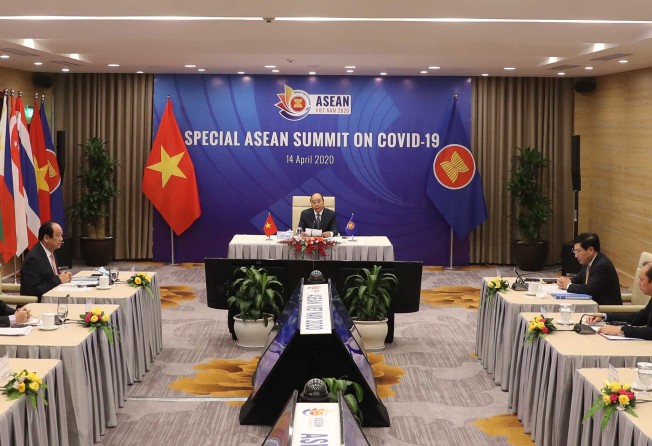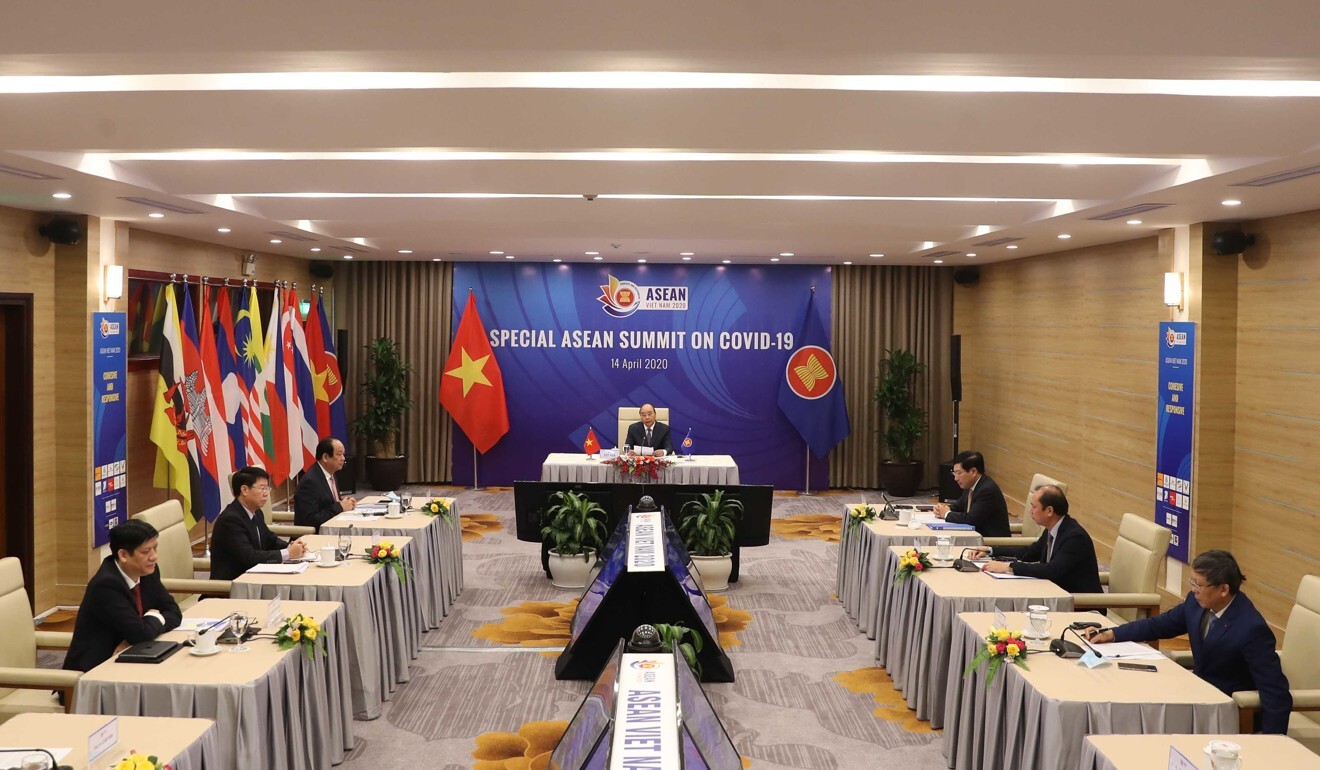Asean holds special coronavirus summit, but will the bloc’s plans come to fruition?
- Southeast Asian leaders meeting for the first time since the pandemic are looking for enhanced cooperation through measures such as an emergency response fund
- But observers point out the association previously showed little appetite for multilateralism, and question whether concrete action will emerge

Southeast Asian leaders conferring on Tuesday for the first time since the Covid-19 pandemic offered full-throated support for enhanced cooperation to combat the public health crisis and deal with its likely far-reaching economic after-effects.
But with the 10 countries in the Association of Southeast Asian Nations (Asean) – almost of half of which are in some form of lockdown – having shown little appetite for multilateralism in the earlier weeks of the pandemic and with the complexity of implementing public health initiatives across borders, observers are questioning whether the rhetoric will be rapidly translated into action.
Of the measures that gained broad support in the Asean special meeting was the formation of an emergency response fund that could be tapped by countries looking to purchase essential medical equipment.
Trade was also top of the agenda in the special summit, which was held by video link. National borders are virtually closed across the region, where confirmed infections currently number nearly 20,000 with nearly 900 fatalities. The Philippines has the highest number of cases with 5,223, followed by Indonesia, Malaysia, Singapore and Thailand.
The leaders held two sets of meetings: in the morning the 10 Asean heads of state conferred among themselves, and in the afternoon they held an “Asean Plus Three” meeting with Chinese Premier Li Keqiang, Japanese Prime Minister Shinzo Abe and South Korean President Moon Jae-in.
In the Asean-only meeting, Philippine President Rodrigo Duterte told his counterparts his country urgently needed trade links to remain open because of the supply shortages it was facing as infections continued to rise.
A day earlier he told citizens in a national address that the lockdown in Luzon – the country’s most populous island – would continue indefinitely as there was “no end in sight” to the contagion.
“We face a shortage of vital medicines and medical equipment and supplies. We need to boost production and facilitate intra-Asean trade of these life-saving necessities,” Duterte said in prepared remarks to the summit. “Asean must remain open for trade. Crisis or no crisis, as no country can stand alone.”
Singapore’s Prime Minister Lee Hsien Loong reminded the leaders that none of the 10 Asean countries were self sufficient in the production of food and medical supplies – the trade of which has been disrupted as countries imposed tough border controls to curb the spread of the disease.
“Closing our borders completely would therefore only deprive us of all the goods and products that we can produce together, hurting our economies and worsening unemployment,” Lee said.
Across the board, leaders expressed their support for the formation of a Covid-19 Asean Response Fund. The initiative was mooted by Vietnam – the bloc’s chair this year – and was approved by foreign ministers in a separate meeting on Friday.

The proposed Asean fund is meant only as a regional piggy bank that countries can tap to buy medical supplies during a future contagion – unlike the €500 billion plan agreed by the European Union as a fiscal cushion for member countries.
The economic impact of the pandemic was also discussed at the Asean meeting, with Malaysian Prime Minister Muhyiddin Yassin – attending his first summit after coming to power in March – proposing a conference of the region’s economic ministers to discuss matters including social welfare and food security.
Longer-term initiatives, such as the development of antivirals and vaccines for Covid-19, were discussed in the bloc’s meetings with the three East Asian leaders.
Speaking to reporters after the roughly two-hour meeting, Japan’s Abe said the leaders had affirmed the importance of developing a treatment for Covid-19, and that he had briefed them on clinical studies being conducted on Avigan, an anti-flu drug developed by a Japanese company.
Chinese Premier Li, meanwhile, said the pandemic had brought the Asean Plus Three countries closer.
“The battle against Covid-19 has made us more aware that we are in a community with a shared future,” Li told the afternoon meeting, according to Xinhua. “We must act with greater synergy and common purpose, and articulate our determination to work together in closer coordination and cooperation and make a collective response to the epidemic.”
Asean watchers – some of whom had complained that the bloc showed little initiative to cooperate in the earlier weeks of the pandemic – said Tuesday’s summit was a welcome development.
Among the criticisms was that the countries failed to coordinate when they began imposing travel bans on countries including mainland China, the early epicentre of Covid-19, in January and February. The need for coordinated policies on travel restrictions during pandemics was discussed during Tuesday’s meeting.
The bloc’s usual schedule has been derailed by the pandemic, with a biannual leaders’ summit that was to have been held in Da Nang in April moved to June.
The leaders were also expected to meet United States President Donald Trump in a one-off US-Asean Summit in Las Vegas in March, but that too was put off.
“I think the special Asean summit was very much needed to show that the regional organisation would not be a passive actor to the Covid-19 pandemic,” said A. Ibrahim Almuttaqi, head of the Asean Studies Programme at Jakarta’s Habibie Centre.
He said the bloc – long ridiculed by some quarters in the West for being an ineffectual talking shop – had tended to come out “stronger and more united” each time it faced a collective crisis. “This may be the case with the pandemic but unfortunately Asean has tended to only evolve after a crisis rather than during a crisis itself,” Almuttaqi said.
Hoang Thi Ha, an Asean researcher with Singapore’s ISEAS-Yusof Ishak Institute, said the proposed emergency fund carried “political significance as an expression of Asean solidarity in the fight against the pandemic”.
But she said expectations in the immediate term needed to be tempered, with details including the source of funding and the involvement of Asean’s partner countries still being worked out.
“Then, as and when the fund is up and running, there is the tricky question of distribution of the acquired medical supplies as the demands are enormous and the shortages are dire across the region,” Ha said. “That would require not only technical deliberations in the health sector but also a great deal of diplomacy and solidarity among the member states.” Additional reporting by Kyodo